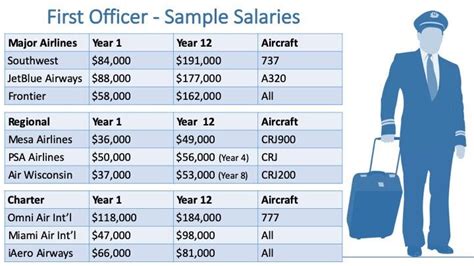Private Vs. Commercial Pilots: Pay, Duties & Distinctions

Are you considering a career as a pilot? It’s important to understand the differences between private and commercial pilots, including their pay, duties, and distinctions. Whether you’re interested in flying as a hobby or pursuing aviation as a profession, this guide will provide you with valuable insights.
1. Private Pilots
Private pilots are individuals who fly for personal purposes rather than for compensation. They typically own or rent small aircraft for recreational flying, sightseeing, or transportation. Here are some key details about private pilots:
1.1 Licensing Requirements
In order to become a private pilot, you must obtain a Private Pilot License (PPL). This requires completing a certain number of flight hours, passing a medical exam, and passing a written and practical flight test.
1.2 Duties and Responsibilities
Private pilots are responsible for the safe operation of their aircraft and the well-being of their passengers. They must adhere to all aviation regulations, plan their flights, conduct pre-flight inspections, and make decisions regarding weather conditions and flight routes.
1.3 Pay and Compensation
As private pilots fly for personal purposes, they do not receive direct compensation for their services. They are responsible for covering the costs of aircraft ownership or rental, fuel, maintenance, and other expenses associated with flying.
2. Commercial Pilots
Commercial pilots, on the other hand, fly for compensation or hire. They can work for airlines, charter companies, or other organizations that require aviation services. Here’s what you need to know about commercial pilots:
2.1 Licensing Requirements
Becoming a commercial pilot requires obtaining a Commercial Pilot License (CPL). In addition to meeting the flight hour requirements, passing medical exams, and passing written and practical tests, commercial pilots must also undergo additional training and obtain additional ratings and endorsements.
2.2 Duties and Responsibilities
Commercial pilots have a wide range of duties and responsibilities depending on their specific role. They may be responsible for transporting passengers or cargo, conducting aerial tours, providing flight instruction, or performing other aviation-related tasks. They must adhere to strict safety protocols and follow the regulations set by aviation authorities.
2.3 Pay and Compensation
Commercial pilots are typically paid a salary or an hourly rate. The exact pay depends on various factors such as the type of aircraft they fly, their job position, and the company they work for. Commercial pilots also receive benefits such as health insurance, retirement plans, and travel perks.
3. Distinctions Between Private and Commercial Pilots
While private and commercial pilots share a passion for flying, there are several distinctions between the two roles:
3.1 Purpose of Flying
Private pilots fly for personal pleasure, while commercial pilots fly for business or employment purposes.
3.2 Certification Requirements
Private pilots need a Private Pilot License (PPL), while commercial pilots require a Commercial Pilot License (CPL).
3.3 Flight Operations
Private pilots typically operate small aircraft, while commercial pilots often fly larger planes or jets.
3.4 Compensation
Private pilots do not receive direct compensation, whereas commercial pilots are paid for their services.
3.5 Career Opportunities
Commercial pilots have more career opportunities and can pursue positions in airlines, cargo operations, flight instruction, aerial surveys, and more.
Conclusion
Whether you choose to become a private pilot or a commercial pilot, both paths offer unique experiences and opportunities. Private pilots enjoy the freedom of recreational flying, while commercial pilots can turn their passion for aviation into a rewarding career. Consider your interests, goals, and aspirations to determine which path is right for you.
Frequently Asked Questions
Q: How long does it take to become a private pilot?
A: The time required to obtain a Private Pilot License can vary depending on factors such as your availability, the training program you choose, and your aptitude for flying. On average, it takes about 6-12 months to complete the necessary training.
Q: What are the career prospects for commercial pilots?
A: The demand for commercial pilots is expected to grow in the coming years. Airlines, charter companies, and other aviation organizations are constantly seeking qualified pilots to meet their operational needs. With the right qualifications and experience, you can explore various career opportunities in the aviation industry.
Q: Can private pilots fly at night?
A: Yes, private pilots can fly at night after obtaining a Night Rating endorsement. This additional training allows private pilots to safely navigate and operate aircraft during nighttime conditions.
Q: Is it possible to transition from being a private pilot to a commercial pilot?
A: Yes, many private pilots choose to pursue a career as a commercial pilot. By obtaining the necessary licenses, ratings, and experience, private pilots can transition into commercial aviation and explore new opportunities.
